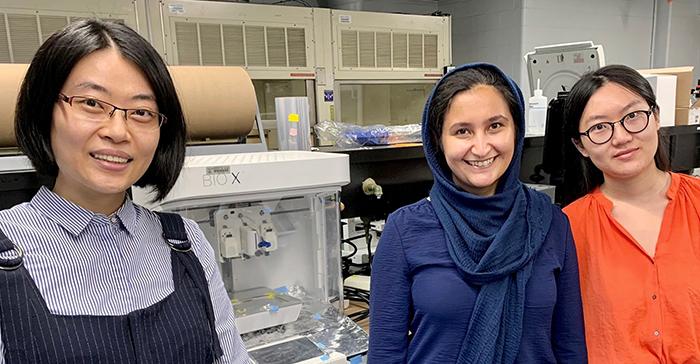
The University of Texas at Austin College of Pharmacy’s Pharmaceutical Engineering and 3D Printing (PharmE3D) Labs recently earned a three-year $1.5 million National Institutes of Health (NIH) R01 grant to research novel manufacturing technology for complex vaccine formulations for influenza and other emerging infectious diseases. The grant was administered by the United States Food and Drug Administration’s (FDA) Center for Biologics Evaluation and Research (CBER). Head of PharmE3D Labs Mohammed (Mo) Maniruzzaman, Ph.D. is the Principal Investigator (PI) of the award that will support two postdoctoral fellows and two Ph.D. students.
“The need for efficient technology to produce vaccines on demand has never been so pressing amid this current pandemic,” says Maniruzzaman, assistant professor in the Division of Molecular Pharmaceutics and Drug Delivery. “I’m proud of my dynamic PharmE3D team, especially Dr. Niloofar Heshmati Aghda who helped crystallize this high-risk high-reward project idea, Dr. Karen Zhang for working on the design and engineering of the SMART platform and Jiawei Wang for undertaking preliminary studies to develop the foundation of this project.”
“I would also like to acknowledge Dr. Bill Williams for collaborating with us on this project, the UT College of Pharmacy for providing us all resources in which our research could thrive and my wonderful family for their unwavering support.”

The Sprayed Multi Adsorbed-particle Reposing Technology (SMART) is a 3D printing technique originally invented to develop small molecule drug particles with precise control over shape and size. The PharmE3D team will broaden its scope to single-step manufacturing of large molecule therapeutics including monoclonal antibodies and recombinant protein vaccines. Recombinant protein subunit vaccines have recently demonstrated promising results for immunization against infectious diseases.
The R01 grant will help the team utilize SMART technology to produce bio-polymers based microcarriers which can be used in large-scale fermentations to produce complex recombinant proteins for vaccines. This SMART technology meets the requirements for recombinant proteins manufacturing such as ease of scale-up and short post-production processing. It also has the potential to improve agility, flexibility, cost and robustness in manufacturing processes for complex protein-based biologics for emerging infectious diseases like COVID-19.
The Research Project Grant (R01) is the original and historically oldest grant mechanism used by the NIH. The R01 provides support for health-related research and development based on the NIH’s mission.

